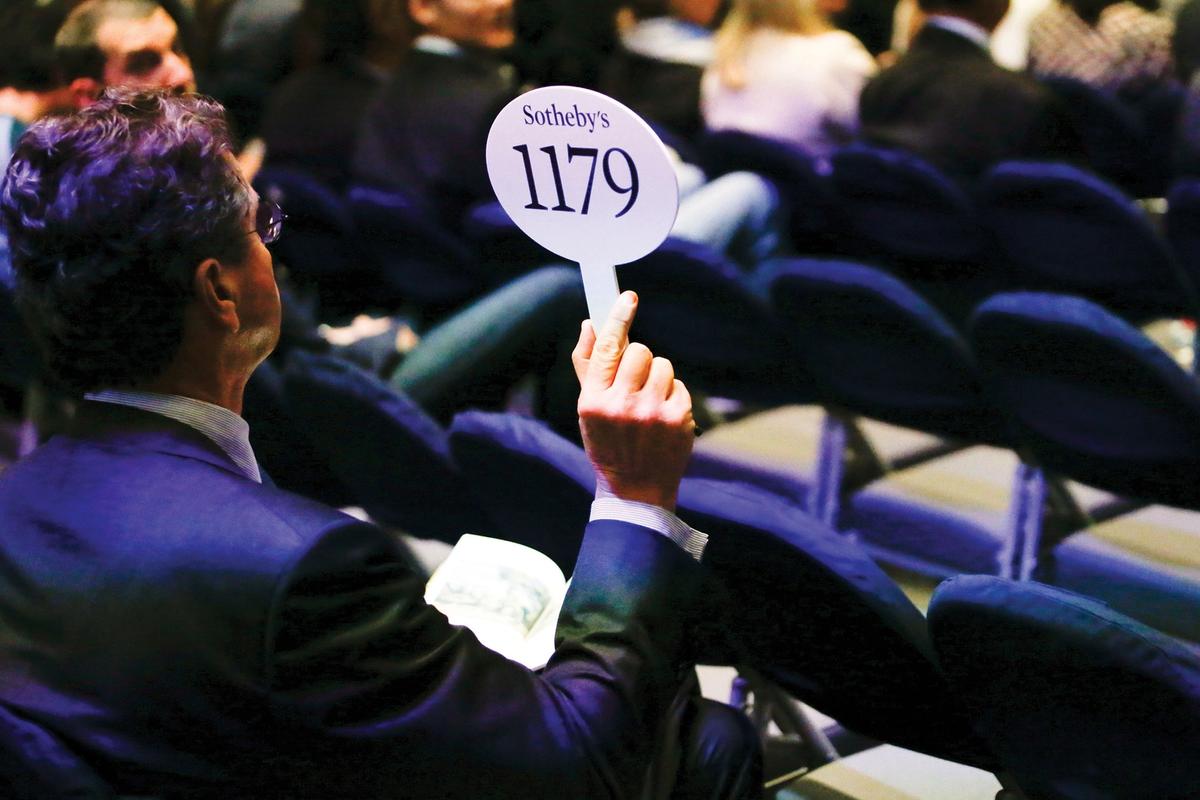The New York City Council recently enacted a series of deregulatory moves that eliminate government regulations of the auction industry, among other businesses. Whether this will help or confuse collectors is uncertain, but it may fundamentally change the way big and small auction houses do business in the multi-billion-dollar New York art market.
These deregulatory moves include eliminating requirements for auction houses to be licensed by the city; the auctioneer’s obligation to disclose guarantees on works provided by the auction house or third-party “irrevocable bids”; and that no auctioneer bidding—called “chandelier bidding”—rises above the consignor’s minimum price or reserve. Regulations in place since the 1980s also required written contracts with consignors to disclose all fees and, to the benefit of buyers, that the consignor warrants title to the “ultimate purchaser”. Additionally, auction houses had been required to keep written records of auctions for six years in case questions as to attribution and title arise.
The city council’s action, which was not requested or lobbied for by the auction industry, has alarmed many players in the art world, who are concerned that the rules of the road for the auction market were changed without any notice.
“The auction system rests on confidence by buyers and sellers that the auction houses are playing by the rules,” says Thomas C. Danziger, a partner in the Manhattan law firm Danziger, Danziger & Muro, who specialises in auction transactions. “Without regulations in place, people may lose confidence in the integrity of the New York auction market.”
Leila Amineddoleh, a lawyer specialising in art in New York, describes the actions of the city council as “shocking”. “For years, people have been calling for greater regulation of the art market, not less,” she says. “If I were a buyer, I’d want to know about an auction house’s ownership interest in a work. Not only will that affect the lot for sale, but it could affect how the auction house markets other works during the same sale.”
The repeal of these regulations went into effect on 10 April (except for the elimination of the auction house licensing requirements, which take effect this month) and is intended to aid a variety of small businesses believed to have been adversely affected by the Covid-19 pandemic, including video arcades, laundromats and car rental agencies. Why auction houses were included in this group is unclear.
Requests for comments from members of the city council, as well as the New York City Department of Consumer Affairs, which oversees the auction field, were not answered.
One of the regulations that has now disappeared, a Department of Consumer Affairs rule that went into effect in 1987, allowed an auctioneer to bid up the price of a lot to the reserve price—the unstated sum below which the consignor will not sell the lot. However, the auction house had been required to disclose this practice. A recent Sotheby’s condition of sale statement, for instance, says, “The auctioneer is entitled to make consecutive bids or make bids in response to other bids on behalf of the seller up to the reserve placed on the lot, although the auctioneer will not indicate during the auction that he is making such bids on behalf of the seller.” After bidding had reached the lot’s reserve price, the law states, “the auctioneer may not bid on behalf of the consignor”. Without this protection, auctioneers could announce bids higher than the reserve when no bids have been placed.
Other practices that are partially revealed at present but could become wholly obscured are guarantees—an agreement between the auctioneer and the consignor promising that, if an item does not sell for at least a minimum pre-specified sum, the auction house itself or a third party will purchase the object—and fees or discounts offered to certain guarantors if the final sales price exceeds the guaranteed amount. At present, these actions are made known to bidders in sale catalogues.
Changing relationships
John R. Cahill, a lawyer with expertise in art, speculates that the concern for buyers and sellers at auction will be if the terms and conditions clauses, which describe the contractual relationship between the company and its clients, are likely to be changed and, if so, whether they will be altered differently for each sale. “It will be interesting to see if what New York City has done will spread to other cities,” he says.
A Christie’s New York spokesperson says such worries are not likely to be borne out. “Christie’s holds itself to the highest ethical standards,” the spokesperson says. “We did not advocate for changes to the regulations and continue to operate as we have been.”
At least in the immediate future, auction houses will continue to do business in the same way, according to Michael McCullough, a partner in the Manhattan law firm Pearlstein & McCullough, who notes that general consumer protection laws will protect buyers and sellers. “The bidding process and the way an auctioneer conducts an auction has been standardised,” he says. “I don’t think this will change.”
However, McCullough adds, “There is one area in which even the old rules proved insufficient: the disclosure of an auctioneer’s financial interest in the sale of an object. The very high end of the auction market operates on guarantees by auctioneers that are backstopped by investors. Expect the creative use of guarantees to continue, and don’t expect greater transparency into those financial arrangements.”


